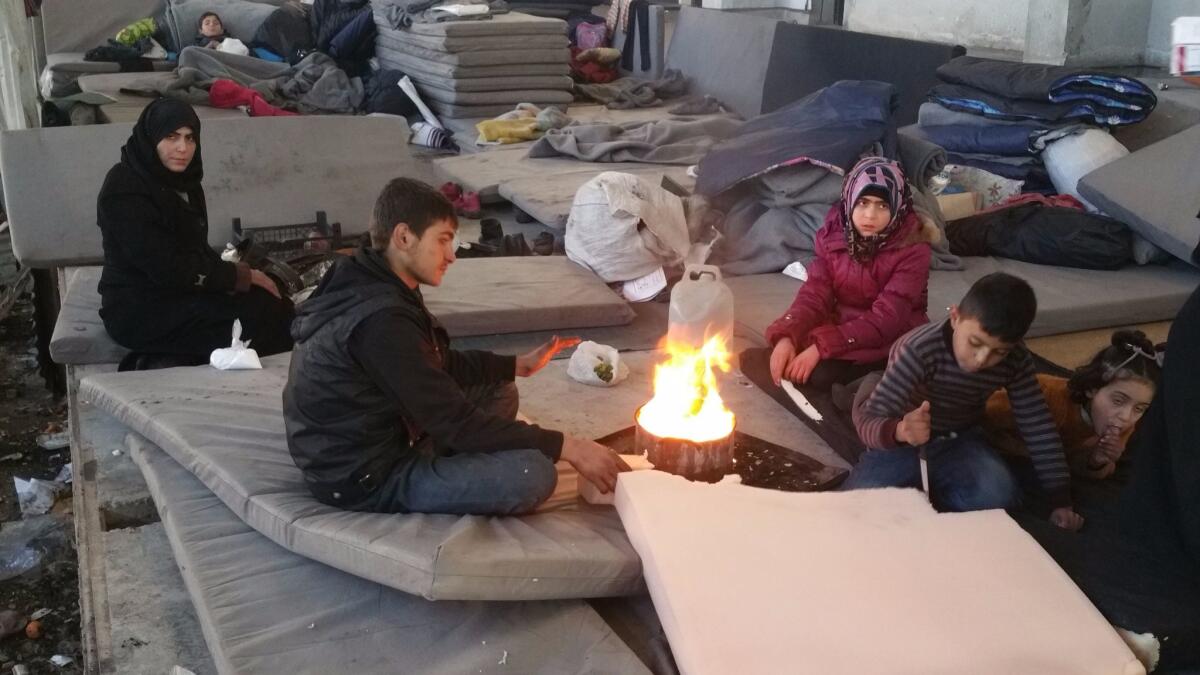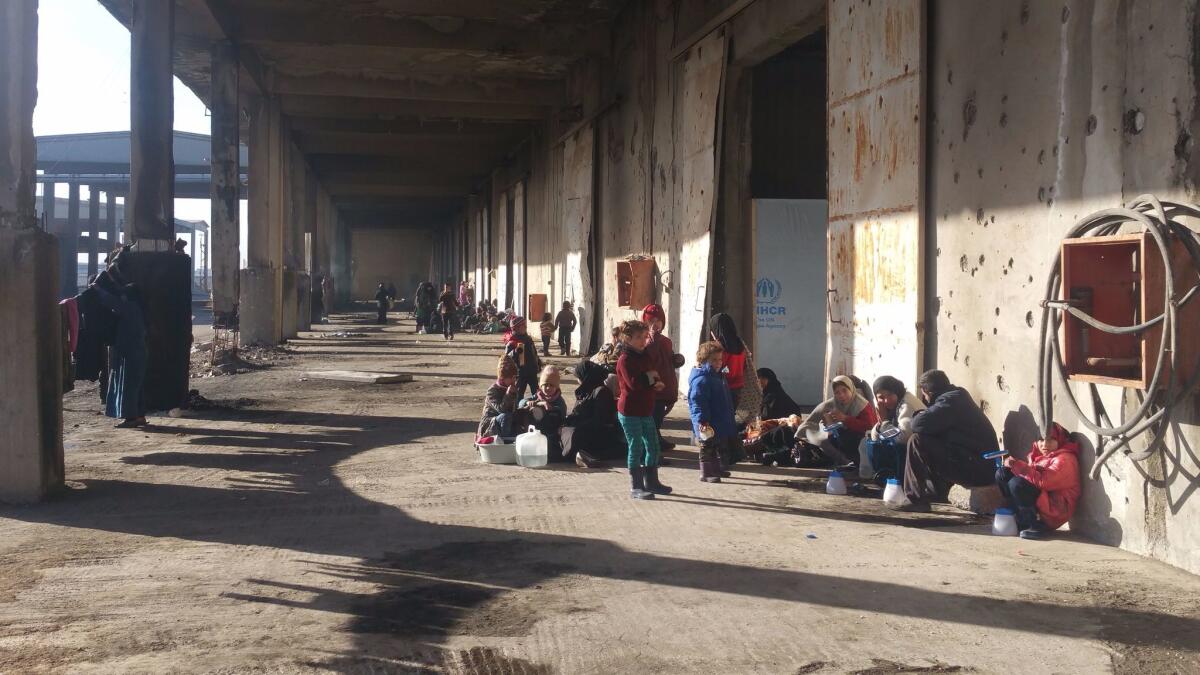Bitter cold and an uncertain wait for the Syrians who made it out of Aleppo

- Share via
Reporting from Jibreen, Syria — At the edge of this shabby industrial town just east of Aleppo, a crowd milled about in front of a former cotton factory that was being used as a shelter.
A mountain of chopped lettuce was heaped on a table, along with stacks of bread and vats of oil. A uniformed soldier handed out falafel sandwiches and cups of sweet tea.
Suddenly, a voice blared out from a trio of large speakers standing across the vast lot of the battered factory.
“May God preserve the state of Syria. Thank God you’re all safe,” it shouted, before launching into an out-of-tune rendition of a patriotic song. The cheers of those congregating before the speakers provided an ardent if imprecise accompaniment, as people huddled in close ranks to fend off the bitter cold.
After pro-government forces attacked the rebel-held eastern districts of Aleppo, tens of thousands streamed out of the area into government-held territories.
They were sent to temporary shelters like this one in Jibreen, which was hastily set up by the Syrian government and its allies, including Russia. Here, people fleeing the fighting cross paths with others preparing to return, anxious to see what is left of their homes.
The exodus from east Aleppo put immense pressure on those giving aid. Last Sunday, recalled Ibrahim Ibrahim, a uniformed young man who ran one of the kitchens, 13,000 people had arrived in one go. “We made 30,000 sandwiches that day,” he said, shaking his head in wonder.
The number of people seeking shelter in Jibreen declined after authorities began offering assistance and clearing the rubble from some of Aleppo’s eastern neighborhoods, said Khaled Suleiman, the 48-year-old engineer who managed the facility. Less than 2,000 remain, all of whom came from areas still under rebel control, or had lost their homes in the five years of war that annihilated wide swaths of Aleppo.
For many, the harsh conditions in the camp are a step up from the ones they escaped after pro-government troops attacked.
“We were so hungry, but we’ve made up for it in eating here,” said one blue-eyed teenager with a wisp of a mustache. He declined to give his name for reasons of privacy.
He sat on a drab-gray mattress, where one of his younger brothers sliced chunks of thick pink sponge – fuel for a fire set up in a charred cooking pot.
Merchants in east Aleppo had engaged in war profiteering, he said, charging exorbitant prices for foodstuffs that had arrived as aid to the rebel pocket of the city.
“A bag of sugar was for $16, a liter of oil was $10. It got to the point where a single cigarette would cost you $8,” he said, rattling off prices that put everyday goods out of reach on his family’s meager income, especially after a bomb killed his father two years ago.

In a side room, a gaggle of children sat on school desks. They shifted their gaze from their teacher, Zainab Sunji, to the notebooks before them in an attempt to replicate the verb conjugations Sunji had written on the board.
“The war really affected these children,” said Sunji, who apologized for the small number of students. Normally she taught 300 children per day, she explained, but most had run out earlier to participate in games organized by aid workers – an activity she deemed essential.
“It helps make them feel better. When they first came here, many of them … it seemed like they had come from another planet.”
One girl, Hamidah Zoori, a waif-like 11-year-old with a gray woolen cap on her head, slowly traced the curves of the words in neat Arabic script.
But she demurred when she was asked to read back what she wrote.
“She doesn’t know how,” said Sunji.
“That’s why she’s writing so slowly. She’s drawing out the letters.”
Outside the hangar, others were more concerned with receiving medical care. They lined up outside a hospital set up by the Russian Ministry of Emergencies. The Russian military had previously been accused, along with the Syrian government, of deliberately targeting hospitals and makeshift clinics in eastern Aleppo.

“We treated wounds from shrapnel, bullets, burns … and we can do minor surgical procedures,” said Col. Oleg Manyilo, a medical officer whose bulky frame belied a sunny bedside manner.
He listened intently to his interpreter, a doctor who gave his name as Hassan, when a woman came in carrying her young son. She said he had a fever and couldn’t walk because of shooting pains in his foot.
Manyilo assigned one of his colleagues to treat the child, before turning to a visiting reporter.
“People were afraid to come here. They had been told that Russians would rape them or kill them,” he said.
“But then they saw we treated them well, and we’re careful to respect their privacy.”
“People were afraid to come here. They had been told that Russians would rape them or kill them.”
— Col. Oleg Manyilo
Thousands were said to remain in the one-square mile area of Aleppo still claimed by the opposition. On Sunday, the evacuation of residents temporarily stalled after gunmen set fire to buses sent to Foua and Kfarya, a pair of Shiite-dominated towns besieged by the opposition that lie about 30 miles southwest of Aleppo.
Damascus has demanded that those towns be evacuated before east Aleppo’s last residents could be relocated to the rebel-held province of Idlib.
Although five buses made it through, the rest of the convoy was blocked by “armed terrorists,” state media said, employing the government’s routine term for the rebels fighting Syrian President Bashar Assad.
Other rebel groups condemned the attack, saying it endangered the lives of east Aleppo residents, who have had their hopes dashed since Friday by successive collapses of the complex cease-fire deal.
Suleiman, who runs the Jibreen shelter, said that no one had been turned away, no matter which area of Aleppo they had come from.
“These are our people…. We couldn’t leave them in the cold,” he said. He turned and pointed to a child playing nearby.
“You deal with a militant in terms of security, but what do you tell this kid? ‘Your father shot at me?’ Some people couldn’t leave. This was their fate.”
Bulos is a special correspondent.
ALSO
Syrian government and rebels blame each other for Aleppo evacuation chaos
Aleppo’s sorrow: Scenes from Syria’s ruined city
Dissident Chinese artist Ai Weiwei finds home too dangerous, but he may go to Syria
More to Read
Sign up for Essential California
The most important California stories and recommendations in your inbox every morning.
You may occasionally receive promotional content from the Los Angeles Times.











